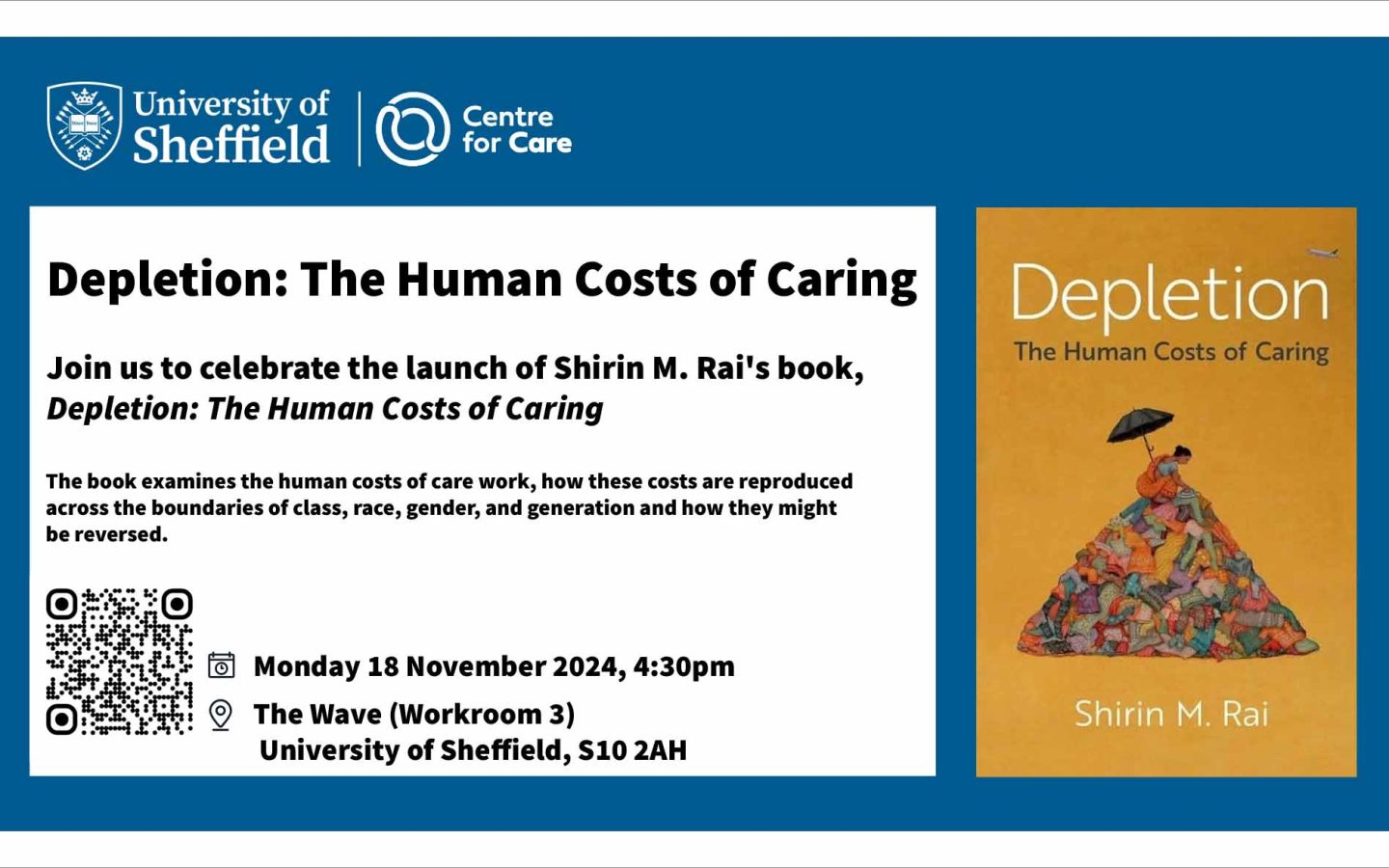Book launch in Sheffield
Date: Monday, 18 November 2024
Time: 4:30 pm – 5:30 pm, followed by refreshments from 5:30 – 6:00 pm
Location: Workroom 3, The Wave, University of Sheffield, 2 Whitham Rd, S10 2AH. Refreshments will be in the Cornerstone on the ground floor of the Wave.
Click to register here (google form) in advance.
About the book
When thinking about the work of caring for others we often neglect the human cost born by those performing this care. Feminists have long talked about the ways in which unpaid work, particularly performed in the home, is habitually undervalued by society; but the work of caring for people, both paid and unpaid, can also take a toll on the health of individuals, households, and communities when we give more than we receive. This lopsided gap between outflows and inflows, as this book argues, is depletion.
In Depletion, Shirin M. Rai examines the human costs of care work and how these are reproduced across the boundaries of class, race, gender, and generation. Depletion can be physical, as measured by the body mass index, exhaustion, sleeplessness, and vital health signs. It can also be mental, manifesting as self-doubt, guilt and apprehension, and the failure to take time for oneself, family, friends, and community. Moreover, depletion has effects that extend well beyond the individual, to households and communities.
Including case studies from different parts of the world and building on various methodologies, Rai looks at the costs of care work, or what she calls “social reproduction” in several forms: biological reproduction, unpaid work in the home, and cultural and ideological work necessary to maintain social relations beyond the household. Various chapters examine the costs of commuting to work and for care, the value of unpaid work performed by women of different classes, the costs of household work performed by children, and the costs to communities when local economies are challenged by corporate interests. Lastly, Rai argues that depletion must be recognized in order for it to be reversed–the struggles to reverse depletion are struggles for a good life, generative of new imaginings of how care work, both draining and joyful, can be reorganized for a better future for all.
About the author
Shirin M. Rai is Distinguished Research Professor, Department of Politics and International Studies, SOAS, University of London. She is a Fellow of the British Academy. Rai’s research interests lie in politics and feminist international political economy, performance and politics, and gender and political institutions. She has published widely in these areas, including Gender and the Political Economy of Development (Polity, 2004) Performing Representation: Women Members in the Indian Parliament (with Carole Spary; OUP), 2019; Oxford Handbook of Politics and Performance (2021; co-eds M Gluhovic, S Jestrovic and M Saward). Her latest book is Depletion: the human costs of caring (2024, OUP).

Chair
Jayanthi is a Research Associate in the Centre for Care, working on the research strand ‘Borders and Care’. The study examines the role of bordering processes in shaping experiences of care among racially minoritised people in the UK who also have experiences of international migration. Jayanthi’s research interests include feminist and critical historical approaches to the international political economy of development, gender regimes, and violence and conflict. She is especially interested in the ways that structural violence and dispossession connect to and manifest in the everyday; on care as part of social reproduction; and on research at the intersection of ‘crisis’ and ‘development’.
Discussants
Grace is a Research Associate working on Digital Care in the Centre for Care, with a focus on digital inequalities, the impact of sectoral fragmentation on technology implementation, and the nature of care labour processes. Previously, Grace taught topics of industrial relations and employment in Sheffield University Management School. She has also worked as an employment law adviser at Acas and as a care worker. Her research interests include the effects of digitalisation on forms of care labour; state policy on care provision and employment regulation; trade union strategies within the social care sector and theorisations of unionism; and labour theory of value and analyses of capital.
Yingzi Shen is a PhD candidate in the Department of Sociological Studies. Her research focuses on the family care provided by elder grandparents in migrant workers’ families, who migrate from rural area to big cities in China; and how inter-generational cooperation, migration and public policies affect care equality and carers’ wellbeing. Prior to her PhD, Yingzi studied Journalism and Communication at Peking University in China. Her master’s dissertation examined how the emotional labour of domestic workers is professionalised and controlled by domestic service companies. Yingzi’s PhD is jointly funded by the University of Sheffield Joint China Scholarship Council Scholarship. Read her latest commentary, ‘The glory and stress of Chinese rural migrant grandparents’, here:
https://centreforcare.ac.uk/commentary/2024/03/chinese-rural-migrant-grandparents/
Majella is a Professor of Social Policy and is Research Lead in the Centre for Care for the group ‘Care Trajectories and Constraints’. Her work is in the field of migration studies with particular focus on the intersections between migration and families / care / gender / ageing / geopolitical transformations, which she approaches from sociological and social policy perspectives. These interests coalesce in different configurations around three key areas: transnational families, transnational political economy of care and migration and transformations. She works with groups traditionally seen as ‘marginalised’ / ‘excluded’ / ‘disadvantaged’, including older people with a migrant background, young migrants and asylum seekers and migrant care workers.
We look forward to welcoming you all.
Please RSVP in advance by using this google form (click).
Events and updates

Lucy Wood writes about the recent Carer’s Trust all day event – Caring Across London: Collaborating for change.
Read More about Carers Trust: Caring across London
We are delighted to virtually welcome Professor Shereen Hussein and Dr. Erika Kispeter from the London School of Hygiene and Tropical Medicine to present for us on 24th March 2026.
Read More about Seminar: From National Policy to Local Practice: Drivers, Tensions and Future Scenarios for UK Adult Social Care Workforce Change
Towards a better future for care: impactful events Fay Benskin and Dan Williamson discuss some of the key recent impact events which the Centre for Care have hosted and/or been involved in. They reflect on policy breakfasts at the House of Commons which focussed on Carer’s Allowance reform and the evidence in support of Paid […]
Read More about Podcast: Impact miniseries episode one
We are very pleased to launch our new impact report today, ‘Towards a better future for care’.
Read More about Towards a better future for care: Centre for Care Impact report (November 2021-April 2025)




